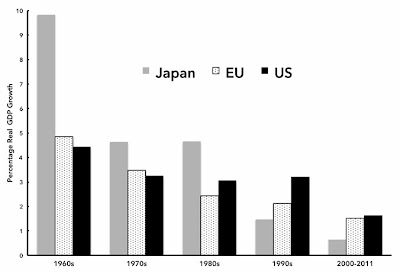As Krugman so ably pointed out in a series of fascinating posts on his NYT blog (read this one here, particularly illuminating), the "normal rules of economic policy don't apply", and "virtue becomes vice and prudence becomes folly". The times have come when, as Keynes famously suggested, it is better to bury money in coal mines and dig it up, paying workers in the process, than do nothing. Or, in Krugman's words: "spending is good, and while productive spending is best, unproductive spending is still better than nothing."
I love his advice to boost the economy. He says, suppose "U.S. corporations, which are currently sitting on a huge hoard of cash, were somehow to become convinced that it would be a great idea to fit out all their employees as cyborgs, with Google Glass and smart wristwatches everywhere. And suppose that three years later they realized that there wasn’t really much payoff to all that spending. Nonetheless, the resulting investment boom would have given us several years of much higher employment, with no real waste, since the resources employed would otherwise have been idle."
So what or who are the culprits?
For Summers, it's the zero nominal interest rate used by Central Banks that hasn't led to any increased lending by banks and won't. Krugman sees more culprits:
- chronic trade imbalances, and there's no denying that the US has moved since the 1980s from a massive surplus to a massive deficit country in its current accounts...and I can think of Germany and China whose remarkable economic growth is rooted in exports and not in internal consumption;
- a shrinking working age population, like in Japan;
- even a "Bob Gordonesque" decline in innovation.
In a Monthly Review article titled "the Endless Crisis" published in May 2012 - thus much earlier than the current brouhaha over stagnation - further causes were suggested, including:
- the decline in manufacture and decreasing utilization of productive capacity;
- the increasing share of GDP going to finance, insurance and real estate, at the expense of the goods-producing industries;
- the increase in the markup of prices over unit labor costs, which means that the share of labor in the economy has now reached a historical low since World War II.
That article, by the way, was written by two respected economists, . It was in fact an introduction to their book by the same title, see here, a must read for anyone concerned by the "Great Stagnation".
I believe however that those astute, sophisticated analyses by celebrated economists are so complex that they tend to hide the obvious. The authors of the "Endless Crisis" do try to make it clear when they write:
"Entrenched and expanding monopolies of wealth, income, and power are aimed at serving the interests of a miniscule portion of the world population, now known as the 1%—or the global ruling classes of contemporary monopoly-finance capital. The world is being subjected to a process of monopolistic capital accumulation so extreme and distorted that not only has it produced the Great Inequality and conditions of stagnation and financial instability, but also the entire planet as a place of human habitation is being put in peril in order to sustain this very system".
This is very suggestive but still couched in obscure economic language that doesn't help the debate. Yet, what is happening is really very simple: weak consumer demand and persistent unemployment are the result of income inequality. A good argument could be made that there is such a strong temporal coincidence between the three factors - all rising together since the 1980s - that a causal relationship between them cannot be excluded. And should be investigated. Intuitively, it makes sense: the One Percent cannot possibly boost a major macroeconomic variable such as national consumption all by itself. A boost must come from the 99 Percent, in particular from a massive, affluent middle class otherwise it won't budge. If the middle class is growing thinner and smaller - and that is the way it looks now - nothing much will happen.
Hence stagnation.
Sorry about that. This is a dismal post, but then, economics was always known as the "dismal science"...
(Source of chart reproduced from Monthly Review article: Data for U.S. from Bureau of Economic Analysis, National Income and Product Accounts, Table 1.1.1. Percent Change from Preceding Period in Real Gross Domestic Product, http://bea.gov/national/nipaweb/SelectTable.asp; Data for Japan and the European Union from World Bank, WDI database http://databank.worldbank.org.)

Comments